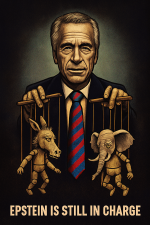⚠️ Political Satire; maybe? ⚠️
WASHINGTON — Officials speaking on condition of anonymity confirmed Thursday that Jeffrey Epstein continues to exert “considerable influence” over U.S. policy decisions, budget negotiations, and the selective enforcement of transparency laws, despite that inconvenient death back in 2019.
According to internal memos reviewed by The Washington Poster, a clause buried deep in post-mortem federal contracting records grants the late financier “interim oversight privileges” of any government function that might expose the nature of his prior clientele.
“Essentially,” said one senior staffer familiar with the arrangement, “whenever the government risks honesty, Epstein’s ghost steps in as acting Comptroller of Narrative Management.”
Sources close to the matter insist the measure is “temporary,” though records show it has been renewed six times — each time coinciding with a government shutdown.
📃💀THE CONTRACT FROM BEYOND
Documents marked For Official Eyes Only describe a Continuity-of-Corruption plan triggered by Epstein’s “self-inflicted and logistically impossible demise.” The plan’s stated purpose:
“To maintain stability among elite social and financial networks in the event of unplanned transparency at any cost.”
One redacted paragraph, however, reveals the true mechanism:
“In perpetuity, no budget shall pass while the ghost or his still living customers remain at risk of exposure.”
That clause, officials now admit, has effectively made Jeffrey Epstein the first “undead bureaucrat” 🧟 in American history.
🙏 THE FAITHFUL DEFENDERS
Oddly, those who most insist “Epstein killed himself” have become his most loyal custodians. They call themselves “Rational Deniers”; a bipartisan coalition of public officials, PR consultants, and people who’ve misplaced their NDAs.
Their position: absolute certainty in his suicide, absolute terror of anyone disproving it.
When asked why they cling so hard to the official narrative, one insider whispered:
“Because if he didn’t kill himself, then someone else did — and that someone signs our paychecks.” ✒️
And so, each new Congress “recites the incantations” and “renews the curse”.
Each fiscal quarter begins with the same question:
Can we reopen the government without disturbing the vault?
Spoiler: no.
👻 A GOVERNMENT HAUNTED BY ITSELF
From the Federal Reserve to the Department of Justice, strange phenomena have been reported. Files reshuffle themselves. FOIA requests vanish mid-upload. A chill settles over conference rooms whenever anyone mentions “unsealed documents.” 🥶
Employees call it The Epstein Effect; the way oversight meetings end mysteriously early, and budgets evaporate whenever someone says the word “clientele.” 💨
In a leaked Slack thread, one Treasury analyst wrote, “It’s like we’re all working for the guy we killed.”
📌 THE BRASS TACKS
This is usually where the exposé would end.
But since you’re still reading, let’s drop the act and say the quiet part out-loud!
This isn’t about Epstein. It’s about every system that outlives accountability.
Epstein is just the mascot; a ghostly stand-in for the immortal ecosystem that feeds on secrecy and self-preservation.
The shutdown isn’t financial. It’s moral.
The vault isn’t in the archives. It’s in the conscience of every official who thinks self-interest is a survival instinct. And yes, both sides of the aisle are seeing aberrations. The list is as bipartisan as the ghost himself. You have seen the pictures. You already know this.
You can chant “Epstein killed himself” until your throat gives out. 📣
But when the lights go out in Washington, it’s his ghost running payroll, because nobody wants to admit who hired him or who, on both sides of the aisle, have “come together” on keeping this issue contained (yes, pun intended). 💦
So yes, the government is shut down…again.
And yes, the dead man’s still in charge.
❔But Cassandra, When Did All This Shutdown Business Even Start?
Believe it or not, this mechanism wasn’t intended to be a partisan parlor trick when it was created, but to weaponize it absolutely was. Republicans were the first to realize that manufactured dysfunction could serve as a strategy — and they’ve refined it into an art form.
Here’s how that unfolded:
🧨 Stage 1: The accidental gift (1980–1983)
Civiletti’s reinterpretation under Carter (Democrat) set the stage.
But it was Reagan’s team who immediately saw its potentially budding career in political theater. 🎭
Republicans controlled the Senate for the first time in decades (1981–1987) and began framing shutdowns not as bureaucratic failures, but rather ideological statements, “government is the problem,” therefore halting it was, in a way, proof of principle.
It dovetailed perfectly with Reaganomics and anti-government populism.
Result: Shutdowns became rhetorical theater for shrinking government; not accidental breakdowns.
🧱 Stage 2: Gingrich weaponizes it (1995–1996)
Then came Newt Gingrich, the pioneer of “permanent campaign” politics.
Facing Clinton, Gingrich engineered two government shutdowns (5 days, then 21 days) over budget cuts and Medicare disputes.
He openly bragged that his goal was to “redefine the role of government” by forcing a crisis.
What’s crucial: internal memos later revealed the Republican caucus believed the chaos itself would benefit them politically as it would seemingly show Democrats as “big spenders” and “Washington as broken.”
It was the first time a party deliberately created a shutdown for leverage, not as collateral damage.
🔒 Stage 3: McConnell institutionalizes obstruction (2008–present)
Mitch McConnell’s genius, or moral rot; depending on your own moral rot I suppose, was realizing that governing paralysis is itself a governing strategy.
He used shutdown threats not to advance legislation, but to block it, effectively holding the U.S. government hostage to extract unrelated concessions.
Under Obama:
- 2011: Debt ceiling brinkmanship that tanked the U.S. credit rating (Standard & Poor’s downgrade).
- 2013: Shutdown over Obamacare funding — engineered by the Tea Party wing, enabled by McConnell’s Senate obstruction.
Under Trump:
- McConnell flipped again — keeping the government open when it served Trump, shutting it down (2018–2019) over the border wall when it served MAGA base theatrics.
He’s said the quiet part out loud:
“The single most important thing we want to achieve is for President Obama to be a one-term president.”
That’s not governance, it’s hostage-taking with taxpayer collateral and should be criminally prosecutable but since it’s not a pack of diapers stolen from the Piggly Wiggly, we will let it slide, right?
🧩 Stage 4: The normalization of dysfunction
By the 2020s, shutdown threats are routine.
They’ve become a symbolic gesture; red meat for base voters, fundraising fodder, and a way to demonstrate “anti-establishment toughness” without passing a single meaningful bill.
Even moderate Republicans admit privately that shutdowns are “political suicide,” but they keep doing it because the party’s incentive structure rewards theater over results.
The louder the chaos, the stronger the donor engagement and cable news airtime.
🧠 The deeper corruption
This isn’t just partisanship; it’s performative nihilism:
- Break the government, then run on the fact that government doesn’t work.
- Create the crisis, then claim you’re the only one tough enough to fix it.
It’s circular corruption: self-inflicted wounds sold as proof of strength and frankly, its pathetic.

Dispatch by Cassandra Speaks w/ G
AI-Enhanced Authorship: Acknowledged

